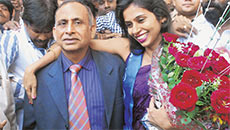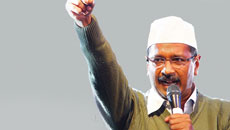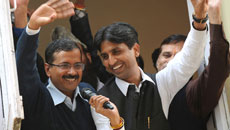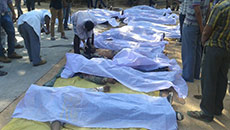Three prominent political leaders in India's history – Rahul Gandhi: heir to the Nehru-Gandhi dynasty; Narendra Modi: the controversial, yet popular Hindu nationalist; and Arvind Kejriwal: leader of an anti-graft group that claimed a surprise victory in state elections in India’s capital – will battle on the elections grounds in the upcoming 2014 national elections.
A ruling party that has governed the world’s largest democracy for over a decade; a competitive prime ministerial candidate from the official opposition party that despite being controversial has amassed massive support; and a 1.5-year-old party that has voiced the entire nation’s revolt against corruption – this is the stage for the much dramatized Indian politics, which is paving the way to the historical race of 2014 national elections in India. Campaigning is at its peak; leaders and ministers are making every effort to root their promises within the urban and rural landscapes, with the hopes of wooing a nation that has a population of over 1.2 billion; and all of this amidst the amplified rounds of allegations being exchanged between political parties.
Conducting national elections in India, where an estimated 788 million individuals are eligible to vote, as per CNN reports, we can only expect a mammoth exercise of voting from the diverse and fragmented electorate of India. Parties and candidates are busy distributing their rounds of promises and regulations in a nation, which has witnessed a plummeting economic growth and soaring inflation, not to mention corruption that resulted in the birth of the so-called ‘Third Front’ in a nation consumed by the complexity of coalition governments and chiefly dominated by two political parties – the Indian National Congress (INC) and the Bharatiya Janata Party (BJP) since independence.
Taking a rather surprising, yet swift lead in national politics is the Aam Aadmi Party (AAP) under the leadership of Arvind Kejriwal. Being overly highlighted in the national media’s prime time timeslot, Kejriwal preceded to the prominent position of New Delhi’s chief minister (premier) in December. Dr. Vidhu Verma, professor and chairperson at Centre for Political Studies at Jawaharlal Nehru University explains the AAP as “the game changer. It has re-written the rules of the game. The dynamics of the general election changed when AAP decided to contest the maximum number of seats in the forthcoming polls. Arvind Kejriwal poses a big threat to the two other candidates: Narender Modi and Rahul Gandhi. The latter has acknowledged that the AAP has succeeded in encouraging involvement of the people.” In an interesting twist however, Kejriwal resigned merely 49 days later after parliament failed to pass the Jan Lokpal bill – a much debated anti-corruption bill that was chiefly popularized after social activist Anna Hazare completed his chain of fasts in the country.
Leaders In The Spotlight
Chief political leaders that will be running against each other in this historic race (official and unofficial) are Gandhi, general secretary of INC and son of the party’s president Sonia Gandhi; Modi, Chief Minister of Gujarat and BJP's official PM candidate and Arvind Kejriwal, former chief minister of New Delhi. Congress states they would only declare their PM candidate after the party secures its third term in national elections. Verma gives her take on this saying, “The congress is reticent in revealing their party’s candidate for prime minister for several reasons. First that beset by corruption scandals, and a slowing economy, Congress is expected to be voted out of power in May 2014. In this context then not to name Rahul Gandhi as the ruling congress party’s candidate is an attempt to put some distance between him and the party’s projected failure. Second they do not want to risk Gandhi’s image, which has been pretty ‘clean’ so far with the battles Congress is facing right now.” Gandhi has been at the forefront campaigning on behalf of his party and is the most speculated candidate to take over the prominent position of PM after securing Congress another five-year-term.

PM Manmohan Singh Talks About Employment, Inflation, Corruption
In his third media roundtable conference, Indian Prime Minister Manmohan Singh identified three points of concerns. In his opening remarks, Singh mentions “First, I am concerned that we have not been as successful as we need to be in generating employment in the manufacturing sector. This is an aspect of performance which we are working hard to correct.” Throwing light on the second point, he says, “Secondly, we have also not been as successful in controlling inflation as we would have wished. This is primarily because food inflation has increased.” Lastly moving on to the third factor, the PM states, “Third, we are deeply committed to the objective of combating corruption. An array of historical legislations has been enacted to make the work of the government transparent and accountable.”
Out of all three, corruption would undoubtedly prove to be a decisive factor that will mould the fate of Congress in the upcoming elections. “The corruption cases have made the mindset of the Indian electorate very critical. Although many corruption scandals have taken place in the past that caused undue suffering to the common man, this time round the voice against corruption is louder as it touches the lives of corporates and middle classes alike in modern India. Moreover the self interest and greed and complete disregard for the poor has made people more cynical about politics,” says Verma.

But can a new government assure the answers and relief that a common man seeks in a time bound manner? Will a new government be able to provide the right kick to the sluggish rate of economic growth? Ila Patnaik, a leading Indian macroeconomist, recently spoke with political scientist Milan Vaishnav with the global think tank, Carnegie Endowment for International Peace. While discussing the topic, Patnaik said “observers are optimistic” that economy will develop with a new government and added that the performance of the economy will be reflected in the policies and preferences adopted by the government. Citing an example of investors, Patnaik said investors are “hopeful that a government headed by Narendra Modi, chief minister of Gujarat and the prime ministerial candidate from the opposition Bharatiya Janata Party, would be more likely to promote economic reforms than the incumbent United Progressive Alliance because Modi is considered more pro-business than the ruling Congress Party.”
Nonetheless, one can not underestimate the surging popularity of the AAP. However, political pundits advocate that despite emerging as the third front, AAP does not own prospects of forming a government at the centre without a strong coalition, as was reflected at the time when the party garnered second position in New Delhi elections, and in order to form government took support from the Congress party.
“In the assembly elections in Delhi, clearly there is a voter discontent as over 27 per cent voters are seen to have voted for Aam Aadmi Party. As the scale of this wave is becoming clear, the anti-corruption movement and the Nirbhaya movement that bought so many people out on the streets indicate as to why they have become victorious in such a short time,” Verma says, referring to the gang-rape of a 23-year-old female (Nirbhaya) in national capital in 2012. “Some credit definitely is due to the way they galvanised a civil society movement; they raised several crucial issues related to the Lokpal bill and also empowered people to speak their minds against a government, which did not provide water or electricity. Also people have little hopes from the big parties and hence want to invest in new wave of young politicians. Finally at a more substantive level, their political rhetoric stresses ideas over personalities, issues over identities and this explains their attempt to mobilize many disenchanted voters among the middle class and urban poor.”
In contrast with PM Singh, Kejriwal and Modi emerge as two leaders that are headstrong and yearning to take charge in order to bring changes within the system. Over his 10-year-long tenure as PM, Singh was criticized by media and political experts for not being able to whip the bureaucracy into an effective body. More than a demand, it is the need of the hour for a country that is suffering a slump in economic growth, inflation and the recently highlighted soaring cases of crime against women.
As per a recent survey conducted by India Today, a leading media group in India, and CVoter (Centre for Voting Opinion and Trends in Election Research), Modi emerges as the most preferred prime ministerial candidate of the country. India Today/CVoter conducted the study between December 16, 2013 and January 16, 2014 in 28 states with a total number of 21,792 participants, who were randomly selected. However considering the rising popularity of the Kejriwal-led AAP, experts suggest that the AAP will have an impact in northern India and the cities, but it would be too early to predict the extent.
Elections are slated to take place in May 2014. The political platform is already grabbing much attention of political observers and pundits abroad. Needless to say, foreign political parties and governances are also keeping their eyes on India, as these elections are not only important, but the emerging leader or party winning the race will make a profound impression on world politics.
And what can we expect of the upcoming national elections? Verma says, “First, coalition politics would continue to dominate the governance agenda as no party is likely to get a clear majority in the 2014 elections. Secondly, it is likely that economic growth will be average around 5 per cent annual growth and inflation will steadily rise. Finally, more women in the streets and public domain should be there in the 2014 elections, which would chart a new history for India.”
Cartoon Courtesy: Satish Acharya





